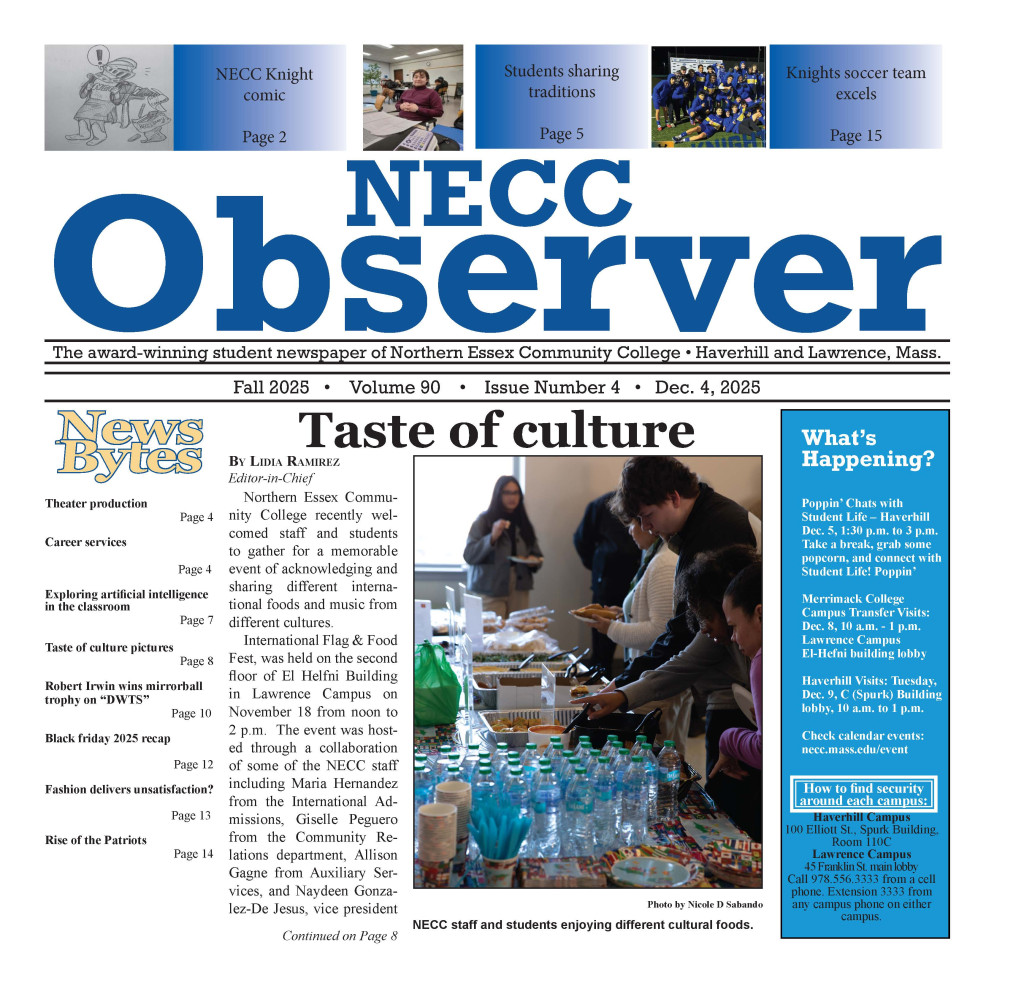Geese are creating a nuisance for the groundskeepers
Traffic comes to a stop on Kenoza Street more and more often these days to let the geese cross the road.
“There’s a good amount of geese. I think there’s two main groups,” says Steve Shepard, who works for the NECC Grounds Department on the Haverhill campus. Shepard thinks that the problem has gotten worse this year.
A group of geese is actually called a gaggle. According to the Mass Wildlife website, gaggles of geese have been passing through for centuries along their natural migration route. Throughout the ’60s and ’70s, a relocation project was begun to move the geese further inland, apparently for hunting purposes.
Since then, the availability of secondary food sources and changes in weather patterns have caused a change in the behavior of the geese. While some groups still fly south for the winter, many geese have found that is no longer necessary and have become year-round residents of many of the nesting grounds that they populate.
Since each full grown goose can produce as much as a pound of droppings each day, sanitation problems can develop in areas where the population is particularly large or bold, and once geese become established in an area, they are reluctant to give it up.
“The geese have been causing trouble with (the athletic fields), too,” said Shepard. “They seem to be getting used to our tactics. Like, even the decoys don’t work, they just walk right by them sometimes.”
Evidence of this can be seen in the form of droppings all along the athletic track, just mere feet from where a styrofoam coyote watches on. “We’re trying everything, everything short of air horns,” said Shepard.
When asked about how they prepare the athletic field before a game, Shepard said that they use leaf blowers for both the grass and the sidewalks, but sometimes they have to resort to shovels to clear the mess.
The geese make their home at the Haverhill reservoir just across Kenoza Street but they have found abundant grazing available on the NECC grounds. “It’s between here and around where the reservoir is. I believe they have some sort of sound cannon that they can use to push them, and then they usually come back here… so it’s kind of us sending them back and forth to each other.” Shepard laughed.
Shepard said that he thinks the school will have to do some research to find out what other people are doing. “We definitely have to change our tactics. They’re getting used to everything,” he said. “We don’t want to hurt them, but we don’t want them in places where they cause a problem, or traffic, too.”
Currently, there is only one chemical treatment on the market approved to deter geese. One company in Everett provides a dog handler and a border collie to patrol the grounds and chase the geese away for a starting rate of $10,000.
The hope is that with the beginning of the school year bringing an increase in human activity around campus, the geese will be more reluctant to spend their days here. Shepard asks that you please do not feed them.
Shepard said, “I’ve been here two years now and I didn’t think we were going to be at war with geese. That wasn’t in the job description.”
For more information about geese, visit the MassWildlife website at http://www.mass.gov/eea/agencies/dfg/dfw/.

